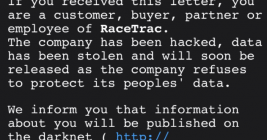

Search Results for “revil” – Krebs on Security
source link: https://krebsonsecurity.com/?s=revil
Go to the source link to view the article. You can view the picture content, updated content and better typesetting reading experience. If the link is broken, please click the button below to view the snapshot at that time.
Search Results for: revil
The criminal group behind the REvil ransomware enterprise has begun auctioning off sensitive data stolen from companies hit by its malicious software. The move marks an escalation in tactics aimed at coercing victims to pay up — and publicly shaming those don’t. But it may also signal that ransomware purveyors are searching for new ways to profit from their crimes as victim businesses struggle just to keep the lights on during the unprecedented economic slowdown caused by the COVID-19 pandemic.
The cybercriminals behind the GandCrab ransomware-as-a-service (RaaS) offering recently announced they were closing up shop and retiring after having allegedly earned more than $2 billion in extortion payments from victims. But a growing body of evidence suggests the GandCrab team have instead quietly regrouped behind a more exclusive and advanced ransomware program known variously as “REvil,” “Sodin,” and “Sodinokibi.”
The U.S. Department of Justice said today it has recovered $2.3 million worth of Bitcoin that Colonial Pipeline paid to ransomware extortionists last month. The funds had been sent to DarkSide, a ransomware-as-a-service syndicate that disbanded after a May 14 farewell message to affiliates saying its Internet servers and cryptocurrency stash were seized by unknown law enforcement entities.
In a Twitter discussion last week on ransomware attacks, KrebsOnSecurity noted that virtually all ransomware strains have a built-in failsafe designed to cover the backsides of the malware purveyors: They simply will not install on a Microsoft Windows computer that already has one of many types of virtual keyboards installed — such as Russian or Ukrainian. So many readers had questions in response to the tweet that I thought it was worth a blog post exploring this one weird cyber defense trick.
The DarkSide ransomware affiliate program responsible for the six-day outage at Colonial Pipeline this week that led to fuel shortages and price spikes across the country is running for the hills. The crime gang announced it was closing up shop after its servers were seized and someone drained funds from an account the group uses to pay affiliates.
The FBI confirmed this week that a relatively new ransomware group known as DarkSide is responsible for an attack that caused Colonial Pipeline to shut down 5,550 miles of pipe, stranding countless barrels of gasoline, diesel and jet fuel on the Gulf Coast. Here’s a closer look at the DarkSide cybercrime gang, as seen through their negotiations with a recent U.S. victim that earns $15 billion in annual revenue.
Some of the top ransomware gangs are deploying a new pressure tactic to push more victim organizations into paying an extortion demand: Emailing the victim’s customers and partners directly, warning that their data will be leaked to the dark web unless they can convince the victim firm to pay up.
In March 2020, KrebsOnSecurity alerted Swedish security giant Gunnebo Group that hackers had broken into its network and sold the access to a criminal group which specializes in deploying ransomware. In August, Gunnebo said it had successfully thwarted a ransomware attack, but this week it emerged that the intruders stole and published online tens of thousands of sensitive documents — including schematics of client bank vaults and surveillance systems.
The Gunnebo Group is a Swedish multinational company that provides physical security to a variety of clients globally, including banks, government agencies, airports, casinos, jewelry stores, tax agencies and even nuclear power plants. The company has operations in 25 countries, more than 4,000 employees, and billions in revenue annually.
Almost daily now there is news about flaws in commercial software that lead to computers getting hacked and seeded with malware. But the reality is most malicious software also has its share of security holes that open the door for security researchers or ne’er-do-wells to liberate or else seize control over already-hacked systems. Here’s a look at one long-lived malware vulnerability testing service that is used and run by some of the Dark Web’s top cybercriminals.
Finastra, a company that provides a range of technology solutions to banks worldwide, said it was shutting down key systems in response to a security breach discovered Friday morning. The company’s public statement and notice to customers does not mention the cause of the outage, but their response so far is straight out of the playbook for dealing with ransomware attacks.
Recommend
About Joyk
Aggregate valuable and interesting links.
Joyk means Joy of geeK

